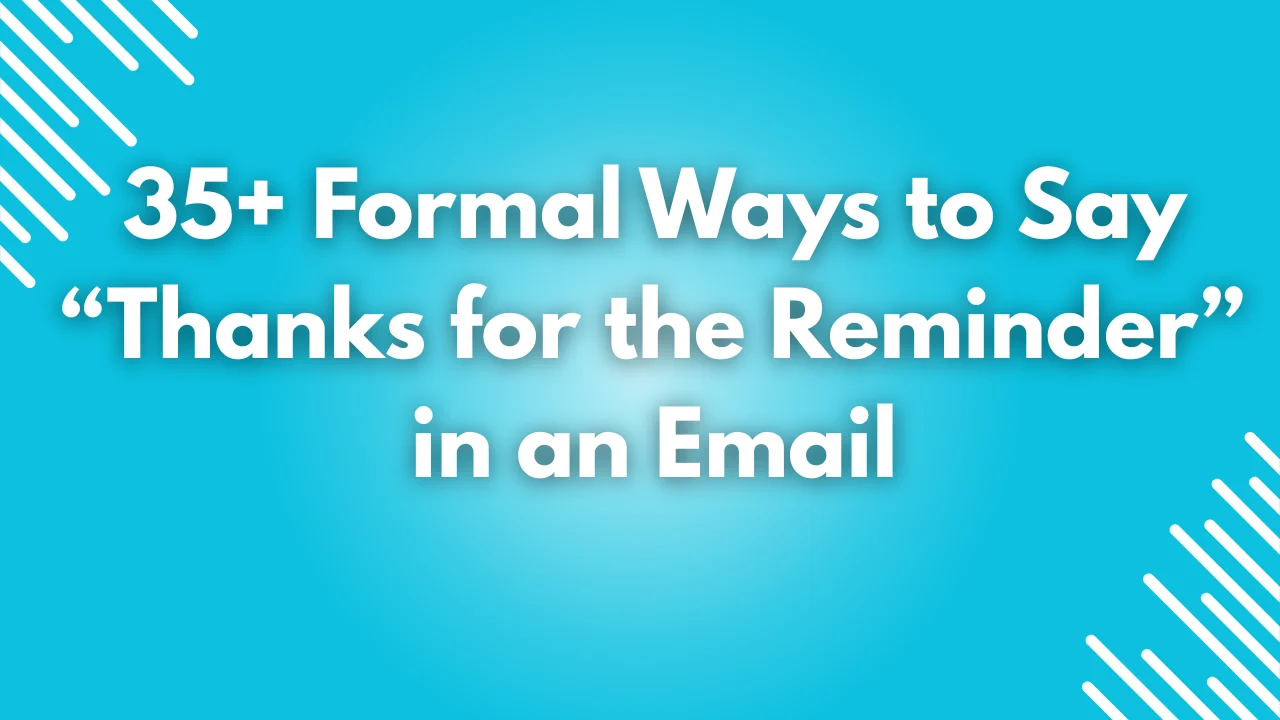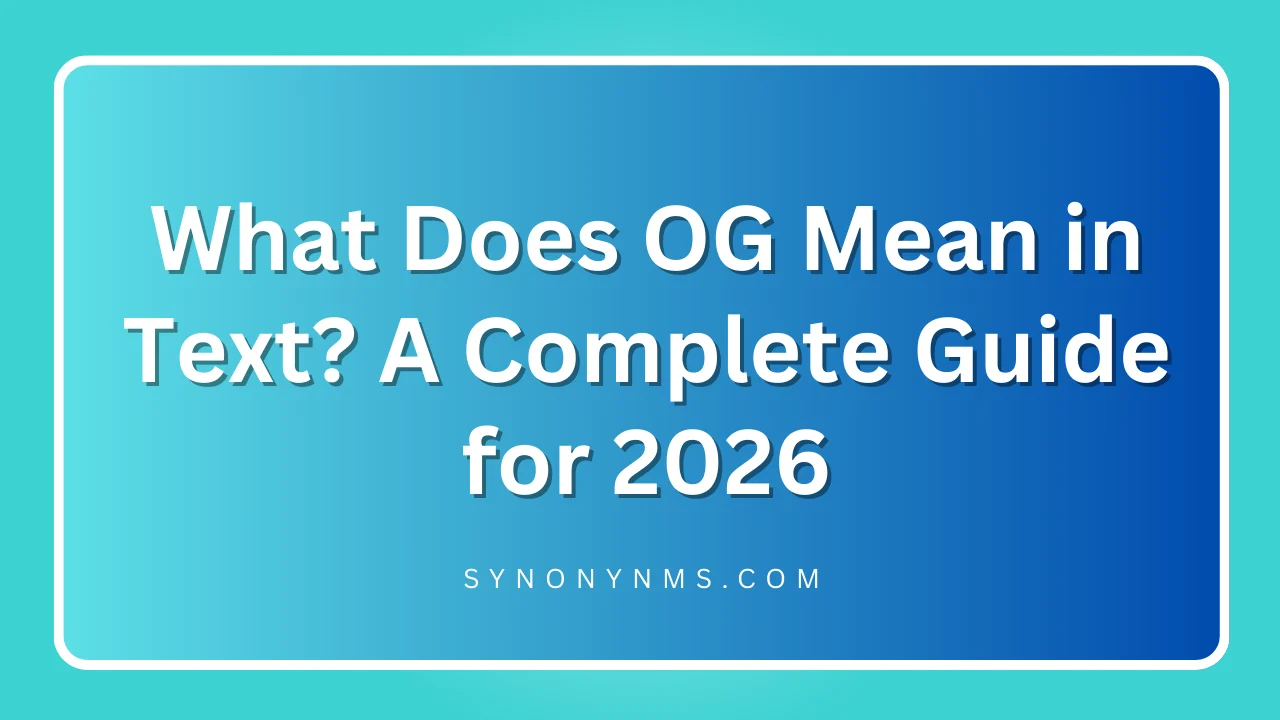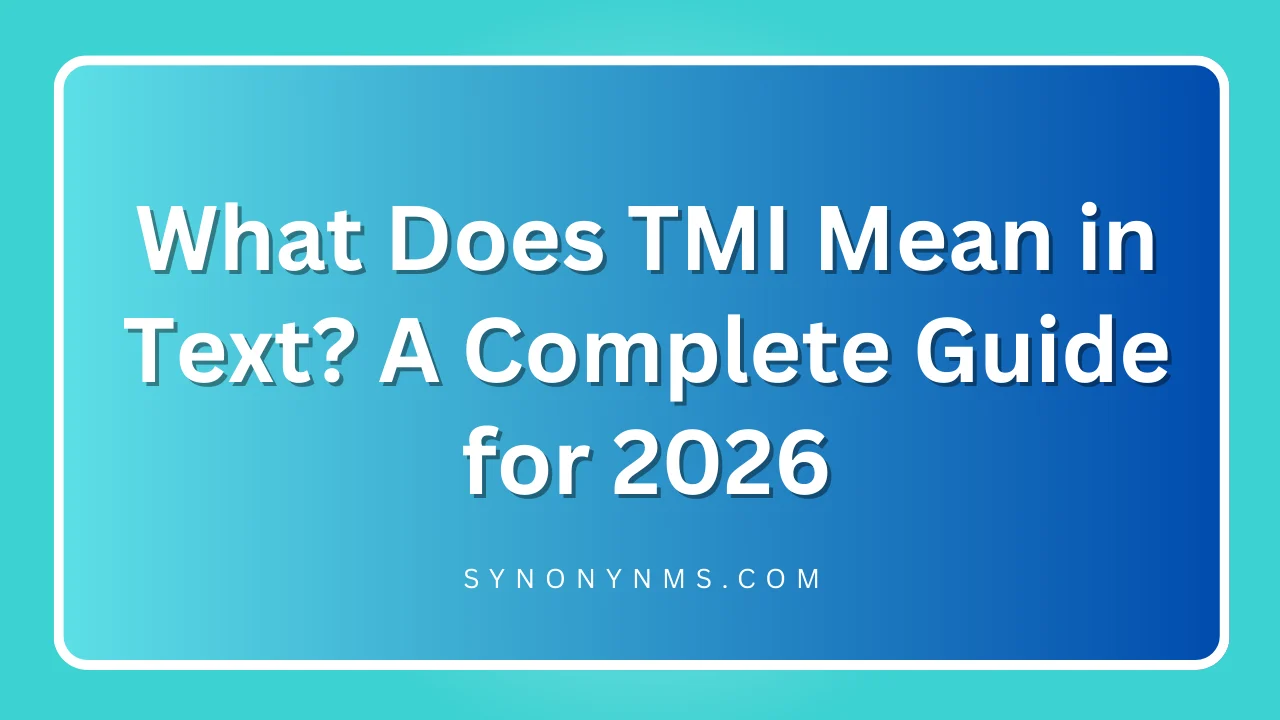“Thanks for the reminder” is a common and polite phrase often used in professional emails. It acknowledges someone’s effort to help you remember an important date, task, or update. However, while it’s perfectly acceptable in casual communication, it can sometimes sound too brief or informal in a corporate or client-facing context.
Using formal alternatives to “thanks for the reminder” can make your communication sound more polished, appreciative, and professional. These alternatives not only express gratitude but also reinforce your attention to detail and respect for the sender’s time.
In this guide, you’ll find 35+ refined ways to say “thanks for the reminder”, complete with meanings, tones, and real-world email examples. Whether you’re replying to a colleague, supervisor, or client, these alternatives will help you communicate with professionalism and warmth.
What Does “Thanks for the Reminder” Mean?
The phrase “thanks for the reminder” acknowledges that someone has helped you recall or stay aware of a task, event, or deadline.
It’s friendly, concise, and polite — but in formal business settings, it may come across as a bit too casual or unvaried if overused.
Example:
Thanks for the reminder about tomorrow’s presentation.
It works well for quick replies, but when addressing clients or upper management, choosing a more formal version shows thoughtfulness and professionalism.
When to Use It
Use “thanks for the reminder” (or its alternatives) when:
- Someone follows up on a pending action or meeting.
- You’re acknowledging a helpful nudge or notification.
- You want to confirm awareness without sounding dismissive.
Examples:
- Thanks for the reminder about the report submission.
- I appreciate you following up on this matter.
Formal alternatives work best in business emails, follow-ups, and project communications where tone matters.
Is It Polite or Professional?
Yes — “thanks for the reminder” is polite. However, its simplicity can make it sound casual or overly brief in professional contexts.
To sound more polished, you can use alternatives like “I appreciate the follow-up”, “Thank you for bringing this to my attention”, or “Your reminder is much appreciated.”
These expressions sound grateful, attentive, and professional, helping you maintain a respectful tone across all corporate communications.
35+ Formal Alternatives to “Thanks for the Reminder” (with Examples)
Below are 35+ professional and polished ways to express gratitude when someone reminds you of something — complete with meanings, tones, and sample sentences.
🔹 Polite & Professional Alternatives
- Thank You for the Reminder
Meaning: A direct, respectful acknowledgment.
Example: Thank you for the reminder regarding tomorrow’s deadline.
Use: Works perfectly in any professional email.
- I Appreciate the Reminder
Meaning: Shows gratitude in a sincere, professional tone.
Example: I appreciate the reminder about the client meeting.
Use: Simple, clear, and polished.
- Much Appreciated
Meaning: A concise yet formal thank-you.
Example: Your reminder is much appreciated.
Use: Ideal for brief acknowledgments.
- I’m Grateful for the Reminder
Meaning: Emphasizes sincere appreciation.
Example: I’m grateful for the reminder and your attention to detail.
Use: Excellent in client or manager correspondence.
- Thank You for Following Up
Meaning: Acknowledges their effort to ensure completion or awareness.
Example: Thank you for following up on this item.
Use: Works well for email follow-ups or project updates.
- Thanks for Bringing This to My Attention
Meaning: Appreciates a timely reminder or notice.
Example: Thanks for bringing this to my attention so promptly.
Use: Polished, professional, and thoughtful.
- Thank You for the Gentle Reminder
Meaning: A polite, slightly warmer tone.
Example: Thank you for the gentle reminder about the invoice deadline.
Use: Excellent for client or vendor communication.
- I Appreciate You Keeping Me Informed
Meaning: Thanks someone for their proactive communication.
Example: I appreciate you keeping me informed about the next steps.
Use: Best for teamwork and project management.
- Your Reminder Is Timely and Appreciated
Meaning: Acknowledges helpful timing.
Example: Your reminder is timely and greatly appreciated.
Use: Sounds attentive and formal.
- Thank You for Notifying Me
Meaning: Recognizes someone’s effort in sharing an update.
Example: Thank you for notifying me about the schedule change.
Use: Common in administrative or HR emails.
🔹 Formal Business Alternatives
- I Appreciate Your Prompt Follow-Up
Meaning: Highlights timeliness and professionalism.
Example: I appreciate your prompt follow-up on this matter.
Use: Great for formal or executive-level correspondence.
- Thank You for the Update and Reminder
Meaning: Combines gratitude for both update and reminder.
Example: Thank you for the update and reminder regarding the report.
Use: Professional and efficient.
- Your Diligence Is Appreciated
Meaning: Acknowledges responsibility and thoroughness.
Example: Your diligence in sending the reminder is appreciated.
Use: Ideal for colleagues or project leads.
- I’m Thankful for Your Follow-Up
Meaning: Expresses genuine gratitude formally.
Example: I’m thankful for your follow-up on this task.
Use: Balanced tone—warm yet professional.
- Thank You for Keeping This on My Radar
Meaning: Acknowledges awareness and timeliness.
Example: Thank you for keeping this on my radar.
Use: Suitable for workplace or executive communication.
- Thank You for the Heads-Up
Meaning: Appreciates advance notice or gentle reminder.
Example: Thank you for the heads-up about tomorrow’s meeting.
Use: Semi-formal and natural for internal emails.
- I Value the Reminder
Meaning: Conveys respect and appreciation.
Example: I value the reminder and will make sure it’s handled on time.
Use: Excellent for concise formal replies.
- I Appreciate You Bringing This Up
Meaning: Recognizes effort in flagging something important.
Example: I appreciate you bringing this up before the deadline.
Use: Works well in project or discussion follow-ups.
- Thank You for the Courtesy Reminder
Meaning: Adds refinement and warmth.
Example: Thank you for the courtesy reminder about my submission.
Use: Elegant choice for client or stakeholder communication.
- I’m Grateful for Your Attention to This Matter
Meaning: Praises attentiveness and professionalism.
Example: I’m grateful for your attention to this matter and the reminder.
Use: Formal, diplomatic tone for high-stakes messages.
🔹 Refined & Executive Alternatives
- Your Follow-Up Is Greatly Appreciated
Meaning: Acknowledges persistence and reliability.
Example: Your follow-up on this topic is greatly appreciated.
Use: Works perfectly in managerial or external correspondence.
- I Appreciate Your Reminder and Support
Meaning: Combines gratitude and collaboration.
Example: I appreciate your reminder and continued support on this.
Use: Strong for team and client relationships.
- Thank You for Promptly Reminding Me
Meaning: Appreciates timeliness and efficiency.
Example: Thank you for promptly reminding me about the upcoming deadline.
Use: Professional and courteous.
- I’m Obliged for the Reminder
Meaning: Very formal and traditional tone.
Example: I’m obliged for the reminder regarding the meeting schedule.
Use: Best suited for highly formal or diplomatic writing.
- Your Message Was Perfectly Timed
Meaning: Compliments the timing and value of the reminder.
Example: Your message was perfectly timed — thank you for the reminder.
Use: Professional yet warm tone.
- Your Proactive Approach Is Appreciated
Meaning: Commends initiative in sending reminders.
Example: Your proactive approach in following up is truly appreciated.
Use: Great for leadership or collaborative contexts.
- Many Thanks for the Follow-Up
Meaning: Slightly formal, widely accepted phrase.
Example: Many thanks for the follow-up on this item.
Use: Suitable for internal or client-facing communication.
- Thank You for Ensuring I Was Aware
Meaning: Polite and thorough acknowledgment.
Example: Thank you for ensuring I was aware of the deadline.
Use: Excellent for considerate formal tone.
- I Appreciate Your Attention to Detail
Meaning: Recognizes thoroughness and attentiveness.
Example: I appreciate your attention to detail and timely reminder.
Use: Formal and flattering.
- Your Reminder Helped Keep Things on Track
Meaning: Acknowledges the reminder’s usefulness.
Example: Your reminder helped keep everything on track — thank you.
Use: Friendly yet polished.
🔹 Concise Yet Formal Closings
- Thank You for the Courtesy Follow-Up
- I Appreciate Your Consistent Updates
- Your Reminder Is Sincerely Appreciated
- I’m Grateful You Brought This Up Again
- Many Thanks for Bringing This to My Attention Once More
Each of these shorter forms maintains a gracious, professional tone, ideal for polite acknowledgments in ongoing conversations.
Conclusion
Acknowledging reminders in a polished, thoughtful way shows not only professionalism but also emotional intelligence in communication. Instead of using the same “thanks for the reminder,” varying your phrasing demonstrates respect, attentiveness, and appreciation. Whether writing to clients, teammates, or leadership, these 35 alternatives will help you express gratitude clearly and confidently — leaving a positive, lasting impression every time.



